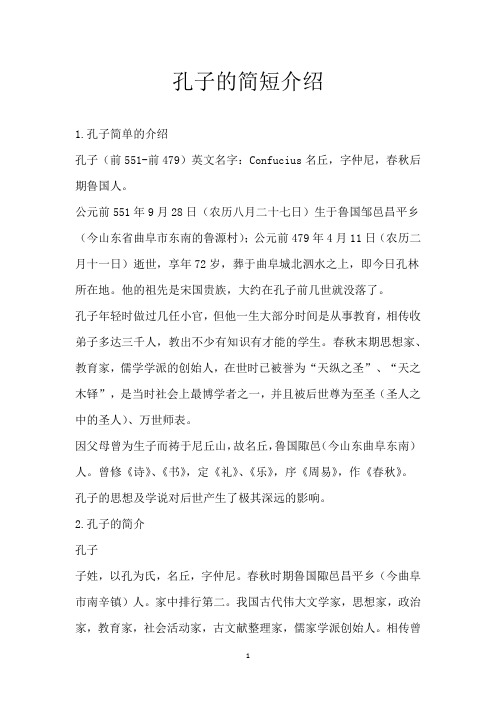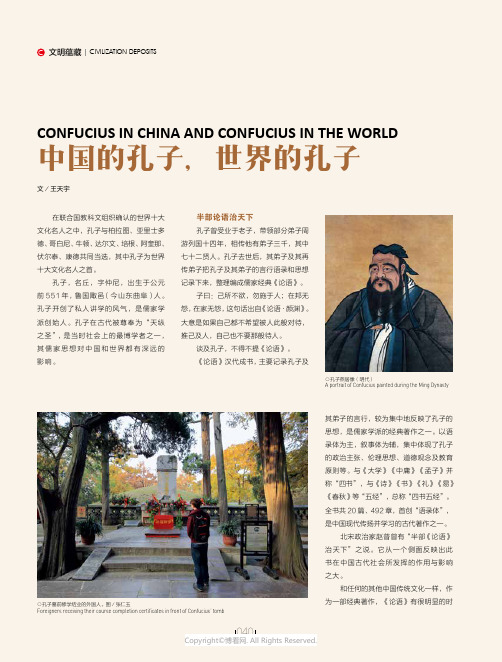Confucius
- 格式:ppt
- 大小:339.00 KB
- 文档页数:14


为什么孔子的英文名叫Confucius我们看到孔子介绍时,会看到孔子名字的英文介绍Confucius,那为什么会这么叫呢?这里面又有什么故事?下面是为你搜集的相关内容,希望对你有帮助!为什么孔子的英文名叫ConfuciusConfucius 这个词最初并不是英文,而是拉丁文。
16 世纪,来自欧洲的天主教耶稣会传教士带着向这个东方大国传播天主教的使命踏上明代中国的土地上时,他们很快发现,当时的中国人,至少是那些处在社会上层的、受过教育的、甚至担任官职的中国人,都信奉一位距离当时已经有两千多年的“哲学家”的教诲,并试图把他的教诲应用到从治国安邦到生活琐事等一系列事务中去。
这位西方传教士口中的博学的伟大哲学家就是孔子。
面对孔子以及当时占统治地位的儒家思想,以来自意大利的利玛窦神父为代表的欧洲耶稣会来华传教士抱着一种尊重甚至热忱的心态去接触并学习。
同样也是在利玛窦的带头下,来自欧洲的天主教传教士们,开始学习当时中国普遍通用的官话,以及在他们眼中是一种沉重的负担的复杂的汉字。
与此同时,西方传教士也开始向欧洲介绍中国,其中很重要的一个方面,就是介绍孔子和当时中国人普遍相信的儒家思想。
传教士们将古代儒家经典翻译成欧洲语言,向欧洲传播。
在这种介绍和翻译的过程中,就不免要翻译儒家创始人至圣先师孔子的名字。
罗马天主教会的官方语言一直以来都是继承自罗马帝国的拉丁语,随着时间的推移,古罗马时代使用的古典拉丁语在中世纪天主教会那里演变成了「教会拉丁语」,并一直使用到今天。
而拉丁语在当时的欧洲,特别是在欧洲学术界,也是沟通各个不同国家与文化的通用语言。
作为天主教圣职人员的利玛窦等耶稣会传教士,在翻译中国经典和中国人名、地名并向他们的欧洲同胞进行介绍的时候,使用的自然也就是教会拉丁语。
利玛窦选取了孔子比较流行的一个称呼孔夫子,将这个名字用音译的方式翻译成拉丁语。
明朝时期的汉语官话的发音与今天普通话发音的区别并不大,而孔夫子三字在明朝官话中的发音也基本上和今天的kǒngfūzǐ一样。

.Today, I will represent our group to introduce a famous person: Confucius, here. (停顿)And I will talk about him from three aspects.As follows:First of all, who is Confucius?Second, what are Confucius’s ideas and views?Third, how and why could Confucian thought in 21st century still retains the interest of people all over the world?一、简介(Introduction)Confucius, known in China as Kongzi, given name Qiuand alias ['eɪlɪəs] Zhongni, was a native of Zouyi of the State of Lu during the Spring and Autumn Period.He put two thoughts forward as “Ren” and “li”.For the reason that Confucius lived in times of many wars, his thoughts about ren cannot be useful. So he devote much time on education. What’s more, he took his disciples [dɪ'saɪp(ə)l] around other countries.As a great thinker, educator and founder of Confucianism, Confucius is an ancient sage(圣人) to the Chinese People. His words and life story were recorded by his disciples and theirstudents in The Analects ['ænəlekts].二、思想主张(Ideas and views)Ren and li are the two core concepts of Confucius’ doctrine about people.First: Li (主张“礼”):Confucius placed emphasis on li with the aim of preserving social order, stability and harmony. Therefore, the Analects says, “The role of li is to maintain harmony among people.” (礼之用,和为贵)Confucius ceremony, is not only the king's gift, the gift of father and son, but the gentleman unmoved attitude in the face of all. (礼的应用,以遇事做得恰当和顺为可)Second: Ren (主张“仁”):Confucius’s most important interpretation of Ren is“Love people”. This love is not only the universal love, furthermore, it should begin with the love for one’s parents. So he said: ”The greatest love for people is the love for one’s parents ”.(仁者,人也,亲亲为大)仁爱就是人的属性,将爱父母亲放在第一位。



孔子的简短介绍1.孔子简单的介绍孔子(前551-前479)英文名字:Confucius名丘,字仲尼,春秋后期鲁国人。
公元前551年9月28日(农历八月二十七日)生于鲁国邹邑昌平乡(今山东省曲阜市东南的鲁源村);公元前479年4月11日(农历二月十一日)逝世,享年72岁,葬于曲阜城北泗水之上,即今日孔林所在地。
他的祖先是宋国贵族,大约在孔子前几世就没落了。
孔子年轻时做过几任小官,但他一生大部分时间是从事教育,相传收弟子多达三千人,教出不少有知识有才能的学生。
春秋末期思想家、教育家,儒学学派的创始人,在世时已被誉为“天纵之圣”、“天之木铎”,是当时社会上最博学者之一,并且被后世尊为至圣(圣人之中的圣人)、万世师表。
因父母曾为生子而祷于尼丘山,故名丘,鲁国陬邑(今山东曲阜东南)人。
曾修《诗》、《书》,定《礼》、《乐》,序《周易》,作《春秋》。
孔子的思想及学说对后世产生了极其深远的影响。
2.孔子的简介孔子子姓,以孔为氏,名丘,字仲尼。
春秋时期鲁国陬邑昌平乡(今曲阜市南辛镇)人。
家中排行第二。
我国古代伟大文学家,思想家,政治家,教育家,社会活动家,古文献整理家,儒家学派创始人。
相传曾修《诗》《书》,订《礼》《乐》,序《周易》,作《春秋》。
他一生从事传道,授业,解惑,被中国人尊称“至圣先师,万世师表”。
后人把孔子的言行语录记录下来,作成《论语》。
在天道观上,孔子不否认天命鬼神的存在,但又对其持怀疑态度,主张“敬鬼神而远之”。
孔子与孟子并称“孔孟”,孔子被尊为“至圣”“素王”,曾子则为宗圣。
孟子为“亚圣”。
他的言行被他的学生写成创世巨作《论语》。
他还是世界最著名的文化名人。
成就孔子对后世影响深远,虽说他“述而不作”,但他在世时已被誉为“天纵之圣”、“天之木铎”、“千古圣人”,是当时社会上最博学者之一。
后世并尊称他为“至圣”(圣人之中的圣人)、“万世师表”,认为他曾修《诗》《书》,定《礼》《乐》,序《周易》(称《易经》十翼,或称易传),著《春秋》。



孔子Confucius (551-479 BC)The Greatest ThinkerAlso known as Kong Zi or Kong Qiu in Chinese, the great thinker Confucius was born to a warrior's family during the late Spring and Autumn Period(770-476 BC). He lost his father when he was only three and lived in poverty with his mother who died when he was 17 years old.When he was young, Confucius was a diligent student with a strong interest in a wide range of subjects. When visiting a temple, he would try to learnthe art of moderating rituals. During the day, he would learn accounting and at night, he would practice playing musical instruments. When helpingothers herd sheep, he would ask to learn archery. Once, he even went to meet Lao Zi, the great philosopher, to ask for advice on conducting rituals.When he was 30, he began to open schools and enrolled some 3,000 students. Among them, 72 were noted scholars who later helped to compileancient books and put Confucius' thinking into the book titled "The Analects".He spent more than 10 years touring various states withhis students and disciples to advocate his ideas on correct conduct and the best government.According to Confucius, the best government is one that rules through rites and people's natural morality, not through bribery and coercion.He explained that if a ruler led his people by morality, he was like the North Star, which would be surrounded by countless other stars. But if he usedadministrative orders and severe punishment to constrain his people, he could probably force them to refrain from committing crimes, but they wouldnot understand that it's shameful to commit crimes. And only when they had acquired the "sense of shame" would they become good.Confucius was also thought to be the editor and author of the Five Classics, namely, Shi (诗Book of Songs), Shu (书Book of History), Li (礼Book ofRites), Yi (易Book of Change) and Chunqiu (春秋Spring and Autumn Annals). He also advocated familial loyalty, ancestor worship, respect of elders bytheir pious children and subjects' loyalty to their ruler.As a result, Confucius' ideology was deemed as dominating force in the feudal society that lasted for more than 2,000 years in China.His thinking also became an important guiding ideology in many countries in East and Southeast Asia, such as Japan and Singapore.His famous quotations include:—Study and review what you have learned every day, isn't it joyful? With friends coming from afar, isn't it delightful? One doesn't frown on other'smisunderstanding, isn't he a respectable man?—To acknowledge one's fault and be willing to change it is the greatest virtue.—If you know, to recognize that you know; if you don't know, to realize that you don't know: That is knowledge.Once, Zi Gong, one of Confucius' disciples, asked the philosopher: "Is there any one word that can guide one throughout his life?" Confucius answered:"Maybe it's magnanimity! What you do not want done to yourself, do not do to others."That's perhaps one of the earliest versions of the Golden Rule.。

confucius的用法和例句【释义】confuciusn.孔子(中国哲学家,教育家)【短语】1Confucius Institute孔子学院;孔子学堂;孔子;孔子学院孔子课堂孔子学校汉学院孔子学堂中华传统文化2disciples of confucius孔子弟子列表;孔子弟子3Beijing Temple of Confucius北京孔庙4Analects of Confucius论语5The Analects of Confucius论语6Confucius Temple孔庙;夫子庙;孔子庙;吉林文庙7Rediscover Confucius重新发现孔子;重新发觉孔子8Taipei Confucius Temple台北市孔庙;台北孔庙9Confucius and Mencius孔孟;孔孟之道;鲁能乃孔孟;框定孔孟【例句】1As Confucius grew up he wanted to learn things.随着孔子长大,他想学习一些东西。
2Confucius was good at music when he was fifteen.孔子十五岁时就擅长音乐。
3Confucius was a pioneer in the field of education.孔子是教育领域的先驱。
4Confucius educated about3,000students in his lifetime.孔子一生中大概教过3000名学生。
5Confucius is considered the greatest of the ancient Chinese sages.孔子被认为是古代中国最伟大的圣人。
6The doodle is the latest in the recent rehabilitation of Confucius.在近来孔子复兴热中,这个涂鸦是最新的表现。
7When he was a man,Confucius became the ruler of the city of Changtu.孔子成年后,成为了昌图市的统治者。

![confucius常见释义[词典]confucius;](https://img.taocdn.com/s1/m/886c4c50974bcf84b9d528ea81c758f5f61f293b.png)
Confucius是一个常见的英文名字,源自中国著名思想家和教育家孔子的名字“孔夫子”。
Confucius在英语中通常被用作名词,用来指代孔子本人或他的思想和学说。
在英语中,Confucius通常使用大写字母来表示。
Confucius的基本解释是孔子,是古代著名的学者和思想家,生活在公元前551年至公元前479年之间,被认为是儒家学派的创始人和主要人物。
同时,Confucius也可以作为形容词使用,用来形容与孔子或儒家思想相关的概念或事物。
例如,Confucianism(儒家思想)就是一个与Confucius相关的名词,用来指代孔子所创立的学派和其思想体系。
总之,Confucius是一个具有代表性的英文名字,通常用来指代孔子或其思想和学说,在英语中具有特定的含义和用法。


confucius读音confucius读音:confucius的英式读音为[kən'fjuːʃəs],美式读音为[kən'fjuʃəs]。
confucius可作名词,指的是儒家学派创始人“孔子”,例句:Confucius's many words are wisdom. 翻译:孔子的很多话都是至理名言。
一、confucius 读音英式读音:[kən'fjuːʃəs]美式读音:[kən'fjuʃəs]二、confucius 词性及释义(n.):孔子等含义;三、confucius 双语例句例句 1. The sayings of Confucius offer guidance on this matter.孔子的教诲为此事提供了指引。
例句 2. Confucius is considered the greatest of the ancientChinese sages.孔子被认为是古代中国最伟大的圣人。
例句 3. We go to the Confucius Temple and enjoy various lanterns there every year on Lantern festival.我们每年元宵节都到夫子庙逛花灯。
例句 4. Confucius, a pioneer in the field of education.孔子,教育领域的先驱。
例句 5. As Confucius said thousands of years ago:正如孔子几千年前所说:例句 6. Inspiration for Modern Education from Educational Method and Thinking of Confucius.孔子的教育思想和教育方法对当代教育的启示。
例句7. Confucius and the Establishment of the Subject Spirit of Chinese Nation孔子与中华民族人文主体精神的确立。


中国的孔子,世界的孔子文/王天宇在联合国教科文组织确认的世界十大文化名人之中,孔子与柏拉图、亚里士多德、哥白尼、牛顿、达尔文、培根、阿奎那、伏尔泰、康德共同当选,其中孔子为世界十大文化名人之首。
孔子,名丘,字仲尼,出生于公元前551年,鲁国陬邑(今山东曲阜)人。
孔子开创了私人讲学的风气,是儒家学派创始人。
孔子在古代被尊奉为“天纵之圣”,是当时社会上的最博学者之一,其儒家思想对中国和世界都有深远的影响。
半部论语治天下孔子曾受业于老子,带领部分弟子周游列国十四年,相传他有弟子三千,其中七十二贤人。
孔子去世后,其弟子及其再传弟子把孔子及其弟子的言行语录和思想记录下来,整理编成儒家经典《论语》。
子曰:己所不欲,勿施于人;在邦无怨,在家无怨,这句话出自《论语·颜渊》。
大意是如果自己都不希望被人此般对待,推己及人,自己也不要那般待人。
谈及孔子,不得不提《论语》。
《论语》汉代成书,主要记录孔子及其弟子的言行,较为集中地反映了孔子的思想,是儒家学派的经典著作之一。
以语录体为主,叙事体为辅,集中体现了孔子的政治主张、伦理思想、道德观念及教育原则等。
与《大学》《中庸》《孟子》并称“四书”,与《诗》《书》《礼》《易》《春秋》等“五经”,总称“四书五经”。
全书共20篇、492章,首创“语录体”,是中国现代传扬并学习的古代著作之一。
北宋政治家赵普曾有“半部《论语》治天下”之说。
它从一个侧面反映出此书在中国古代社会所发挥的作用与影响之大。
和任何的其他中国传统文化一样,作为一部经典著作,《论语》有很明显的时○孔子燕居像(明代)A portrait of Confucius painted during the Ming DynastyCONFUCIUS IN CHINA AND CONFUCIUS IN THE WORLD○孔子墓前修学结业的外国人。
图/张仁玉Foreigners receiving their course completion certificates in front of Confucius’ tomb代特征,有很强烈的远古韵味,里面有很多激动人心的东西,当然也有一些和当今时代相背离的东西。
